2017年人教版初中英语八年级英语上册全套课文知识点同步精讲Unit9
八年级上人教版unit9知识点
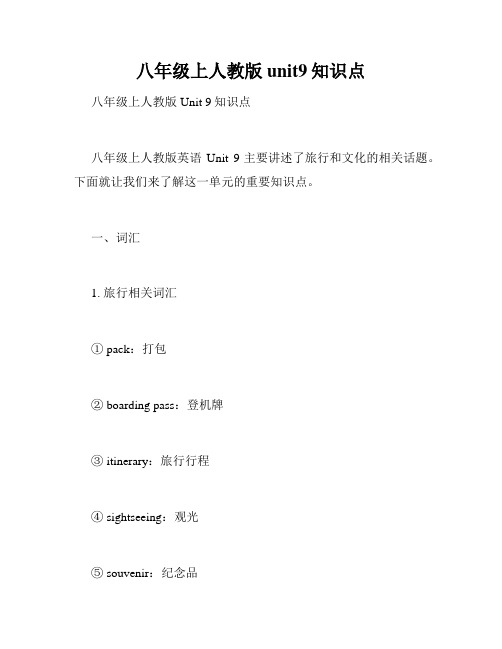
八年级上人教版unit9知识点八年级上人教版Unit 9知识点八年级上人教版英语Unit 9主要讲述了旅行和文化的相关话题。
下面就让我们来了解这一单元的重要知识点。
一、词汇1. 旅行相关词汇① pack:打包② boarding pass:登机牌③ itinerary:旅行行程④ sightseeing:观光⑤ souvenir:纪念品⑥ travel agency:旅行社⑦ tourist attraction:旅游胜地2. 语法1. 一般现在时旅行相关对话使用一般现在时,例如:① What do you usually pack when you travel?② What kind of souvenirs do you usually buy?2. 一般过去时旅行中出现的时间过去时使用一般过去时,包括:① went,took,saw,bought,visited等② What did you do last weekend?3. 现在进行时旅行计划中的动作通常使用现在进行时,例如:① I am packing my bags for the trip.② She is planning to visit Beijing next week.4. 现在完成时表示已经去过或者做过某事情,使用现在完成时,例如:① I have been to the Great Wall.② Have you ever tried the local food when you travel?5. 选择疑问句提出选择性质问题时使用选择疑问句,例如:① Do you prefer traveling alone or with a group?② Would you rather visit a big city or a small town?二、常用句型1. 问路句型Excuse me, how can I get to…?Can you tell me the way to…?Is it far from here to…?2. 寻找帮助句型Excuse me, could you help me?I wonder if you could tell me…Do you know where I can find…?3. 对话句型① What are you going to do this weekend?I am going to…/I am planning to…② Did you go anywhere special on your last vacation? Yes, I went to…/No, I didn't go anywhere special.三、文化知识在旅行中,我们还需要了解一些文化知识,这对于我们更好地了解当地的风俗习惯,与当地人交流有很大帮助。
人教版八年级上册第九单元知识点全八上unit9知识点
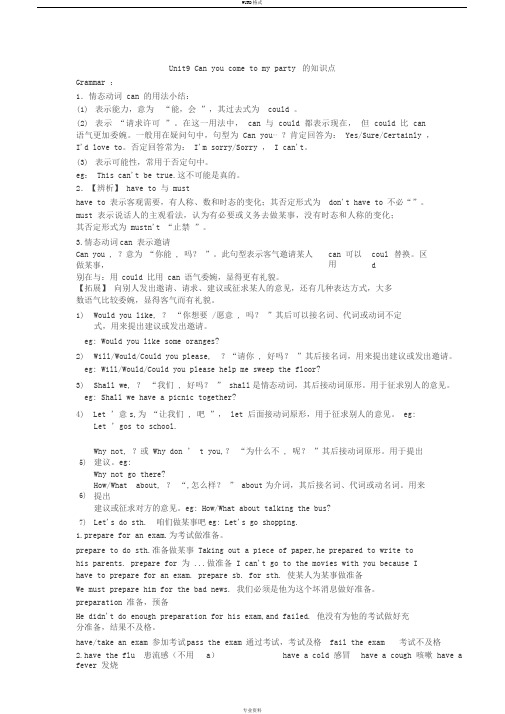
Unit9 Can you come to my party 的知识点Grammar :1.情态动词 can 的用法小结:(1)表示能力,意为“能,会”,其过去式为 could 。
(2)表示“请求许可”。
在这一用法中, can 与 could 都表示现在,但 could 比 can 语气更加委婉。
一般用在疑问句中,句型为 Can you⋯?肯定回答为: Yes/Sure/Certainly ,I'd love to。
否定回答常为: I'm sorry/Sorry , I can't。
(3)表示可能性,常用于否定句中。
eg: This can't be true.这不可能是真的。
2.【辨析】 have to 与 musthave to 表示客观需要,有人称、数和时态的变化;其否定形式为don't have to 不必“”。
must 表示说话人的主观看法,认为有必要或义务去做某事,没有时态和人称的变化;其否定形式为 mustn't “止禁”。
3.情态动词can 表示邀请Can you , ?意为“你能 , 吗?”。
此句型表示客气邀请某人做某事,别在与:用 could 比用 can 语气委婉,显得更有礼貌。
can 可以用could替换。
区【拓展】向别人发出邀请、请求、建议或征求某人的意见,还有几种表达方式,大多数语气比较委婉,显得客气而有礼貌。
1)Would you like, ?“你想要 /愿意 , 吗?”其后可以接名词、代词或动词不定式,用来提出建议或发出邀请。
eg: Would you like some oranges?2)Will/Would/Could you please, ?“请你 , 好吗?”其后接名词,用来提出建议或发出邀请。
eg: Will/Would/Could you please help me sweep the floor?3)Shall we, ?“我们 , 好吗?” shall是情态动词,其后接动词原形。
人教版初中英语八上unit9知识点
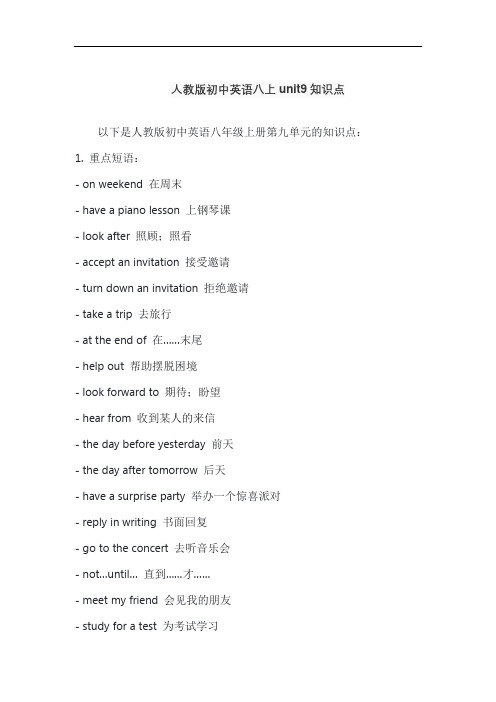
人教版初中英语八上unit9知识点以下是人教版初中英语八年级上册第九单元的知识点:1. 重点短语:- on weekend 在周末- have a piano lesson 上钢琴课- look after 照顾;照看- accept an invitation 接受邀请- turn down an invitation 拒绝邀请- take a trip 去旅行- at the end of 在……末尾- help out 帮助摆脱困境- look forward to 期待;盼望- hear from 收到某人的来信- the day before yesterday 前天- the day after tomorrow 后天- have a surprise party 举办一个惊喜派对- reply in writing 书面回复- go to the concert 去听音乐会- not…until… 直到……才……- meet my friend 会见我的朋友- study for a test 为考试学习2. 重点语法:- 用can 来表达邀请- Can you come to my party on Saturday?- Sure, I'd love to.- Sorry, I can't. I have to prepare for an exam.- 用must 来谈论职责和义务- I must finish my homework first.- I have to look after my sister.- 用might 来表示可能性- He might come to the party.- She might not be able to come.3. 重点句型:- Can you come to my party? 你能来参加我的聚会吗?- I'd love to, but I'm afraid I can't. 我很愿意,但恐怕不能。
人教版八年级英语上册Unit9知识点精讲
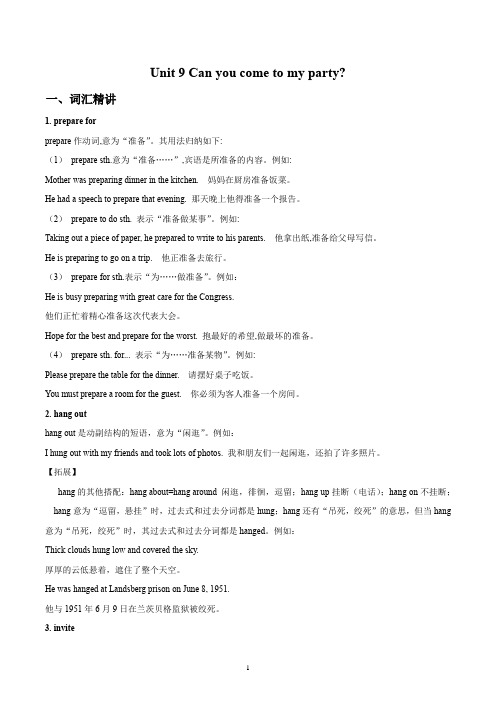
Unit 9 Can you come to my party?一、词汇精讲1. prepare forprepare作动词,意为“准备”。
其用法归纳如下:(1)prepare sth.意为“准备……”,宾语是所准备的内容。
例如:Mother was preparing dinner in the kitchen. 妈妈在厨房准备饭菜。
He had a speech to prepare that evening. 那天晚上他得准备一个报告。
(2)prepare to do sth. 表示“准备做某事”。
例如:Taking out a piece of paper, he prepared to write to his parents. 他拿出纸,准备给父母写信。
He is preparing to go on a trip. 他正准备去旅行。
(3)prepare for sth.表示“为……做准备”。
例如:He is busy preparing with great care for the Congress.他们正忙着精心准备这次代表大会。
Hope for the best and prepare for the worst. 抱最好的希望,做最坏的准备。
(4)prepare sth. for... 表示“为……准备某物”。
例如:Please prepare the table for the dinner. 请摆好桌子吃饭。
You must prepare a room for the guest. 你必须为客人准备一个房间。
2. hang outhang out是动副结构的短语,意为“闲逛”。
例如:I hung out with my friends and took lots of photos. 我和朋友们一起闲逛,还拍了许多照片。
【拓展】hang的其他搭配:hang about=hang around 闲逛,徘徊,逗留;hang up挂断(电话);hang on不挂断;hang意为“逗留,悬挂”时,过去式和过去分词都是hung;hang还有“吊死,绞死”的意思,但当hang 意为“吊死,绞死”时,其过去式和过去分词都是hanged。
人教版英语八年级上第九单元知识点整理
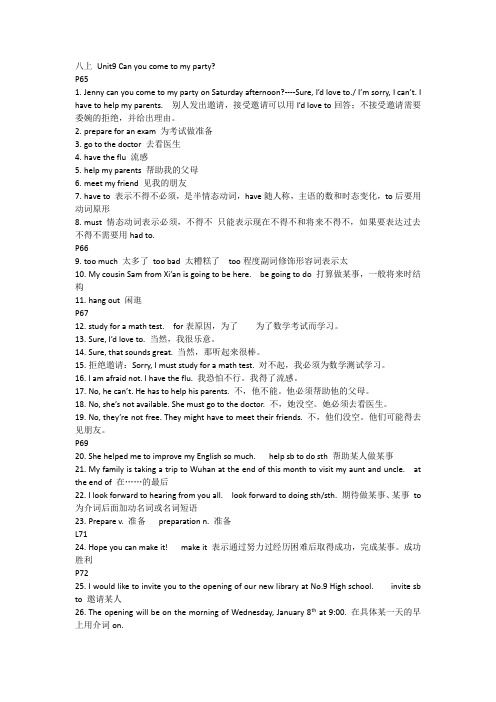
八上Unit9 Can you come to my party?P651.Jenny can you come to my party on Saturday afternoon?----Sure, I’d love to./ I’m sorry, I can’t. I have to help my parents. 别人发出邀请,接受邀请可以用I’d love to回答;不接受邀请需要委婉的拒绝,并给出理由。
2.prepare for an exam 为考试做准备3.go to the doctor 去看医生4.have the flu 流感5.help my parents 帮助我的父母6.meet my friend 见我的朋友7.have to 表示不得不必须,是半情态动词,have随人称,主语的数和时态变化,to后要用动词原形8.must 情态动词表示必须,不得不只能表示现在不得不和将来不得不,如果要表达过去不得不需要用had to.P669.too much 太多了too bad 太糟糕了too程度副词修饰形容词表示太10.My cousin Sam from Xi’an is going to be here. be going to do 打算做某事,一般将来时结构11.hang out 闲逛P6712.study for a math test. for表原因,为了为了数学考试而学习。
13.Sure, I’d love to. 当然,我很乐意。
14.Sure, that sounds great. 当然,那听起来很棒。
15.拒绝邀请:Sorry, I must study for a math test. 对不起,我必须为数学测试学习。
16.I am afraid not. I have the flu. 我恐怕不行。
我得了流感。
17.No, he can’t. He has to help his parents. 不,他不能。
人教版英语八年级上册Unit9单词+课文+知识梳理
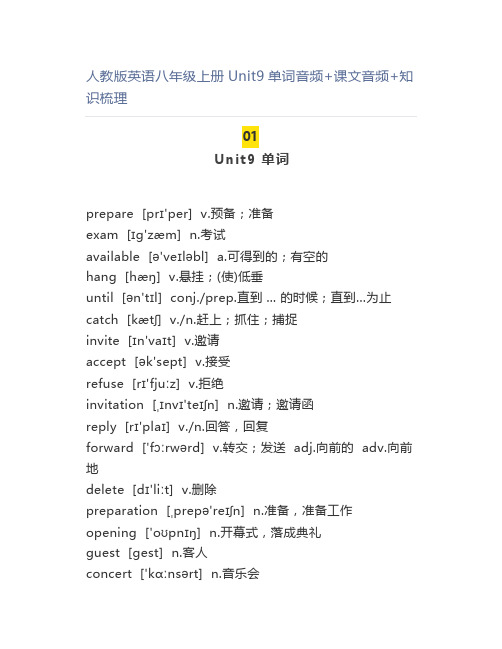
人教版英语八年级上册Unit9单词音频+课文音频+知识梳理01Unit9 单词prepare [prɪ'per] v.预备;准备exam [ɪɡ'zæm] n.考试available [ə'veɪləbl] a.可得到的;有空的hang [hæŋ] v.悬挂;(使)低垂until [ən'tɪl] conj./prep.直到 ... 的时候;直到…为止catch [kætʃ] v./n.赶上;抓住;捕捉invite [ɪn'vaɪt] v.邀请accept [ək'sept] v.接受refuse [rɪ'fjuːz] v.拒绝invitation [ˌɪnvɪ'teɪʃn] n.邀请;邀请函reply [rɪ'plaɪ] v./n.回答,回复forward ['fɔːrwərd] v.转交;发送 adj.向前的 adv.向前地delete [dɪ'liːt] v.删除preparation [ˌprepə'reɪʃn] n.准备,准备工作opening ['oʊpnɪŋ] n.开幕式,落成典礼guest [ɡest] n.客人concert ['kɑːnsərt] n.音乐会headmaster [ˌhed'mæstər] n.校长event [ɪ'vent] n.大事,公开活动calendar ['kælɪndər] n.日历,日程表02U n i t9课文03U n i t9知识梳理Unit9. Can you come to my party?【重点短语】1、on Saturday afternoon 在星期六下午2、have to 必须3、 prepare for 准备4、go to the doctor 去看病5、have the flu 患流感6、help my parents 给父母帮忙7、come to the party 参加晚会8、meet my friend 见朋友9、go to the party 参加晚会10、too much homework 太多的家庭作业11、go to the movies 去看电影12、another time 下次,另外的时间,别的时间13、last fall 去年秋天14、hang out 闲逛15、after school 放学后16、on the weekend=on weekends 在周末17、study for a test 备考18、visit grandparents 拜访爷爷奶奶19、the day before yesterday 前天20、the day after tomorrow 后天21、have a piano lesson 上钢琴课22、look after 照看23 make an invitation 制定邀请24、accept an invitation 接受邀请turn down (refuse) an invitation 拒绝邀请25、take a trip to Wuhan 去武汉旅游26、at the end of this month 在本月底27、look forward to + doing 期望/渴望28、the opening of… 开幕/开业29、reply in writing 写回信30、go shopping 购物31、do homework 做作业32、go to the concert 参加音乐会33、not…until… 直到......才......【重点句型】1. --Can you come to my party on Saturday afternoon?星期六下午你能参加我的晚会吗?--Sure, I’d love to. / Sorry,I can’t. I have to prepare for an exam.当然,我愿意去。
9.人教版英语八年级上册第九单元知识点总结_
Unit9Can you come to my party?(一)短语和句型知识点Section A1a-1ce to来,到来2.on Saturday afternoon在星期六下午3.How\What about you?那你呢?4.I’d love to.=I’d like to.我乐意,我愿意。
5.have to=must+v-原形,必须6.be ready for=prepare for为.....做准备7.go to the doctor=see a doctor看医生8.have the flu=get a flu=have a flu患流感9.prepare for an exam备考1.Can you come to my party?情态动词can的基本用法,其过去式位could,后接动词原形,无人称和数的变化。
(1)表能力,“能,会”1)I can speak(speak)English.2)Can you play(play)the guitar?—Yes,I can.\No,I can’t.(2)表许可(多用于口语),“可以,能”1)I can go go)home tomorrow.2)You can play(play)the computer games after finishing your homework.(3)表推测,can’t“不可能,不会是”;can用于疑问句中,“可能是”1)The man can’t be(be)Li Lei.2)Can this be(be)true?(4)用于表示委婉的请求,其常用句型为:Can you come to...?\Could you come to...?\Would you like to come to...?肯定回答用:1)Sure,I’d love to\I’d like to;2)It sounds great.否定回答用:1)I’d love to\like to,but+理由;2)I’m sorry\Sorry+理由;3)I’m afraid not.(恐怕不行。
人教版初二英语八年级上册Unit9知识点
人教版初二英语八年级上册Unit9知识点Unit9 Can you come to my party?【重点词语/短语用法解析】1. one…another… 表示不确定数目中的另一个one…the other… 表示两者中的另一个I don't like this one, can you show me another?I have two brothers. One is a lawyer and the other is a manager. some…others…表示没有范围限定的“一些…...另一些...…”some…theothers… 表示某一范围的“一些...…其余的…...”Some go to school by bike and others go to school by bus.Some go to school by bike and the others go to school by bus.2. invite v. 邀请n. invitationinvite sb. to do sth.“邀请某人干某事”invite sb. to+地点名词1) Mr. Green invited me to visit his factory last week.2) Thanks a lot for your invitation3) Thanks for inviting me to your party.3.(1)What’s the date today? 意为“今天是几月几号?” It’s +月+日。
(2)What day isit today? 意为“今天是星期几?”It’s + 星期几。
—What’s the date? —It’s Se ptember 10th.—What day is it today? —It’s Wednesday.4.have a lesson(class) 上课have an English lesson5.prepare v. 准备n. preparationprepare sth. “准备某物”,所准备的东西就是后面的宾语。
八年级人教版上册英语unit9知识点
八年级人教版上册英语unit9知识点本文将为大家介绍八年级人教版上册英语unit9的知识点。
本单元的主要话题是旅游,涉及到人称代词的使用、现在进行时态、趋向性介词、标点符号等方面的内容。
一、人称代词在本单元中,会经常用到人称代词来代替主语、宾语等。
人称代词的种类有:主格代词、宾格代词、物主代词等。
具体的代词如下:主格代词:I、you、he、she、it、we、they宾格代词:me、you、him、her、it、us、them物主代词:my、your、his、her、its、our、their需要注意的是,当代词作宾语时,要放在动词或介词的后面。
例如:- What are you doing?- I am reading a book.二、现在进行时态在本单元中,涉及到了现在进行时态(Present Continuous Tense),表示正在进行的动作。
其构成是:主语+be动词+动词-ing。
例如:- She is swimming in the pool.需要注意的是,现在进行时态只适用于正在进行的动作,和习惯性的动作不同。
例如:- He is eating breakfast in the morning. (不正确)- He eats breakfast in the morning. (正确)三、趋向性介词本单元中的一个重要知识点是趋向性介词。
趋向性介词用于描述方向或移动的目的地。
常用的趋向性介词有:to、into、onto、out of、off等。
例如:- She is walking to the park.- The cat is jumping onto the table.四、标点符号在本单元中,标点符号的使用也很重要。
常见的标点符号包括:句号、问号、感叹号、逗号、分号、冒号等。
需要注意的是,这些标点符号的使用要严格遵照语法规则,否则会影响句子的理解。
例如:- What are you doing? (问句)- Look out! (感叹句)- I like swimming, but I don't like diving. (逗号分隔两个并列句)- He has three hobbies: playing basketball, listening to music, and reading. (冒号引出列表)以上是本单元的主要知识点介绍。
人教版八年级上册unit9全部知识点
、单词prepare v. 预备;准备prepare for 为 ......... 做准备exam 考试flu 流行性感冒;流感available 可得到的;有空的;un til 直到… 的时候;直到…为止hang 悬挂;(使)低垂catch 赶上;抓住;捕捉invite 邀请accept 接受;refuse 拒绝weekend 工作日(周一到周五的任何一天)invitation 邀请;邀请函reply 回答,回复forward 转交;发送,向前的delete 删除print 打印;印刷sad (令人)悲哀的;(令人)难过的goodbye 再见glad 高兴;愿意preparation 准备,准备工作glue 胶水without 没有;不(做某事)surprised 惊奇的;感觉意外的housewarming 乔迁聚会opening 开幕式,落成典礼concert 音乐会headmaster 校长event 大事,公开活动guest 客人calendar 日历,日程表Daytime 白天;日间Ted 特德(男名)May 梅(女名)Vince 文斯(男名)Steen 斯蒂恩(姓)Jake 杰克(男名)Susan 苏珊(女名)重点单词1 invite v. 邀请♦i nvite sb. to sth. 意为"邀请某人加..... ;邀请某人到 ... ”。
如:I ' m going to invite my friends to my party this Sunday.♦invite sb. to do sth. 意为“邀请某人做某事”。
如:The young man invited me to sing just now.【链接】invite 的名词形式是invitation 。
与invitation 相关的短语有:make an invitation 发出邀请accept an invitation 接受邀请turn down / refuse an invitation 拒绝邀请2 refuse v. 拒绝不及物动词:I don ' t know if Lily will refuse.advice.refuse 还可用作及物动词。
- 1、下载文档前请自行甄别文档内容的完整性,平台不提供额外的编辑、内容补充、找答案等附加服务。
- 2、"仅部分预览"的文档,不可在线预览部分如存在完整性等问题,可反馈申请退款(可完整预览的文档不适用该条件!)。
- 3、如文档侵犯您的权益,请联系客服反馈,我们会尽快为您处理(人工客服工作时间:9:00-18:30)。
2017年人教版初中英语八年级英语上册全套课文知识点同步精讲Unit 9 Can you come to my party?课文重难点讲解【教师寄语】:Tomorrow never comes.我生待明日,万事成蹉跎Section A1.Jenny, Can you come to my party on Saturday afternoon?你能参加我的晚会吗?【解析】can 情态动词“能,会”,⑴can后跟动词原形,无人称和数的变化,表示某人所具备的能力或技能肯定回答:“Yes, 主语+ can .”否定回答: “No, 主语+ can’t”—Can he swim? —Yes, he can / No, he can’t⑵can的否定形式can’t ,过去式could⑶Can you…?你能……吗?表示客气地请求某人做某事,can 可用could 替换,could 比can 更客气、委婉,显得更有礼貌。
如果接受邀请:I’d love to…/Thanks a lot…/Certainly如果不能接受:I’m sorry ,but I can’t…—Can you go fishing with me? —Sure,I’d love to.【巧记】—Can you come to my party?—Sure, I’d love to.—I’m sorry. I can’t . I have to help my mom.①I can ________(sing ) my ABC.( )②—Can you come to my party on Saturday afternoon?—__________.I’ll have to help my parents.A. Sorry, I can’tB. Yes, I’d love toC. Let’s goD. No, I don’t think so 【2014四川成都】—Hate cannot drive out hate; only love ___________do that.—Martin Luther King, Jr.A. canB. mustC. should【2014 浙江丽水】23.Here is my phone number . You ____call me anytime you like.A.mustB.canC.shouldD.need【2013浙江杭州】--Pauline has lost her phone.–No. It’s in her bag. I _________ hear it.A. mustB. canC. mayD. shall2. I have to prepare for an exam. 我要为考试做准备。
【解析】prepare for sth . 为某事做准备【2013安徽2】—I can’t find David. Where is he?—He __________for tomorrow’s competitions at home.A. preparesB. is preparingC. has preparedD. prepared【解析】exam[ɪɡ'zæm] n考试(指正式的考试,如入学考试、期中考试等)Pass the exam 考试及格fail (in) the exam 考试不及格take /do an exam参加考试3. I’m sorry, I can’t . I ①have to②help my parents.对不起,我不能。
我得帮助我的父母。
【解析1】⑴have to “不得不,必须”,,表示客观情况要求某人必须做某事⑵第三人称用has to ,过去式had to,后跟动词原形,变成否定句或疑问句借助助动词do/does/did(可以用于各种时态)【注】否定形式don’t have to = needn’tIt’s raining outside, I have to stay at home.【注】:have/has to/must词条用法例句have to “不得不”这种要求多来自客观因素I have to stay at home because of thebad weather.must “必须” 这种要求多来自主观因素I must study hard.【2014乐山2】–The manager says that there’s no hot water after8:00 tonight.–You mean we ______ go to bed without a shower. How terrible!A. canB. have toC. may【2014贵州安顺】—Must I do my homework now?—No, you __. Y ou may have a rest.A. mustn'tB. needn'tC. can'tD. wouldn't 【解析2】help v帮助→helpful adj. 有帮助的1). help sb. to do sth. 帮助某人做某事2). help oneself (to )自用(食物等)3). help sb. out 帮助某人克服困难,渡过难关、解决问题、完成工作4). with the help of 在……帮助下5). help sb. with sth. 帮助某人做某事6).Can’t help doing 情不自禁做....【2013日照】—Mary is so _____ —she comes to you whenever you’re in trouble.A. usefulB. carefulC. thankfulD. helpful【2012烟台】The woman __ all of her money to charities_____ the poor.A. gave off, to helpB. gave up, helpingC. gave away, to helpD. gave, helping4. I must go to the doctor.我必须去看医生。
【解析1】must “必须;一定”,表示主观的义务和必要,常用于肯定句和疑问句。
由must引起的疑问句,肯定回答用must, 否定回答用needn’t/don’t have to 【2014黑龙江龙东地区】-Must I get up at 6 o’clock?-No, you ________.You can get up at 7 o’clock.A. mustn’tB. needn’tC. can’t【2014湖北十堰】—Mom, must I take out the trash now?—No, you ________. You may take a rest first.A. mustn’tB. can’tC. shouldn’tD. don’t have to 【注】mustn’t表示“禁止;不可以”而don’t have to 表示“不需要;不必”【2013四川宜宾】—Li Lei, hurry up! The bus is coming.—Oh, no. We ______ cross the street until the traffic lights turn green.A. mustn’tB. may notC. needn’tD. have to 【2014云南】34. We_____ use mobile phones when the plane takes offA. may notB. shouldn’tC. needn’tD. mustn’t 【解析2】go to the doctor =go to see a doctor 去看医生【2012成都】—Where did you go yesterday, Rick?—I went to see a ____ because I had a cold.A. teacherB. doctorC. Reporter【2014十堰】—What would you like to say to your ________ before leaving school?—I’d like to say “Thank you very much! I’ve learnt a lot from you in the past three years.”A. teachersB. workersC. doctorsD. engineers5. I have too much homework weekend. 这周末我的家庭作业太多了。
【解析】(1)too many + 复数名词许多too many people(2)too much +不可数名词许多too much homework(3)much too +形容词太…much too cold【2011贵州安顺】20. The new kind of car is _____ dear, I don’t have _____ money.A. too much; much tooB. much too; too muchC. too much; too muchD. much too; much too【2013玉林】—The meat is ______ delicious. —Yes, but don't eat ______.A. too much; too muchB. much too; too muchC. too much; much tooD. much too; much too6. I’m sorry, I’m not available. 抱歉,我没有空。
【解析】available[ə'veɪləbl] adj.可得到的;有空的=free⑴人做主语时指人“能够出席的,有时间做某事的”Are you available for a meeting tomorrow morning?⑵物做主语时,指物“可用的;有效的”用法:词性中文释义备注例句形容词有空的(free)不用于名词前Will she be available today?可获得的常用于名词前This is the only room available.( ) —Hello! Golden Sun Hotel. Can I help you?—Do you have a room _____for this weekend.A. availableB. usefulC. emptyD. possible7. Oh, but Sam isn’t leaving until next Wednesday. 哦,但是萨姆直到下周三才回去。
